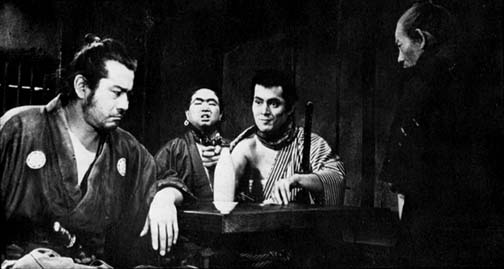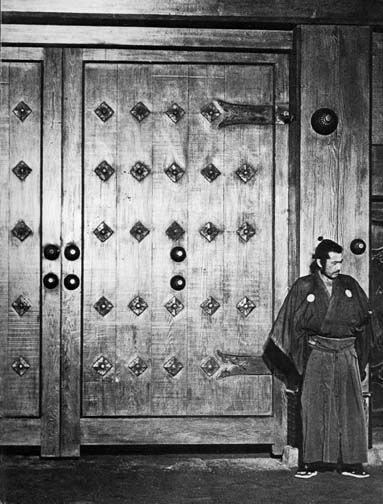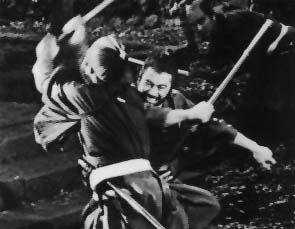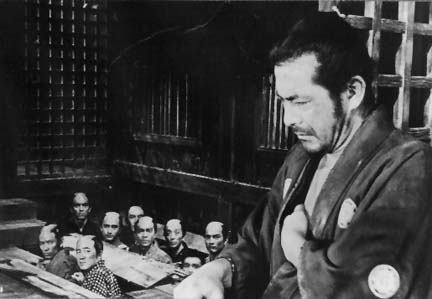

Though starvation is not usually an issue in modern times, there are many analogies to recent conditions in the academic job market. While the previous generation of academics enjoyed a period of rapid growth enabling full employment for Ph.Ds, more recent recipients of the Ph.D have found almost zero prospect for advancement along traditional lines. Ironically, the laws of supply and demand have created a strong Darwinian effect, with the typical job seeker of today being much more qualified than those hired in more freewheeling times. One upshot of this is the phenomenon of academic ronin, who wander the country seeking any suitable employment (for which they are generally overqualified and underpaid).
Though in many ways I personally have been fortunate in my own career, I have definitely had the ronin experience. I offer the following brief synopsis of my career as an illustration of the situation, which should stand as a warning to all.
When I had started graduate school in the mid-80s, it was considered a "normal" career path to do one postdoc before moving into a tenure-track faculty position, if indeed you did not begin one directly after the Ph.D. When I completed my Ph.D. at the University of Michigan in 1992, it was considered obligatory to do one postdoc, and common to do two before being considered for a faculty position. I was lucky: I was offered two prestigious postdoctoral fellowships, both of which granted the freedom to pursue my own research program rather than someone else's (which I always thought was the point of the Ph.D). I accepted a fellowship at the Institute of Astronomy of the University of Cambridge. By all accounts I did very well there.

By the time my position at Cambridge came to an end in 1995, it was considered obligatory to do two postdocs before being considered for a faculty position, and increasingly common to do three. In astronomy, NASA had created the Hubble Fellowship program, and made it instantly prestigious by throwing lots of money at it (a Hubble Fellow got paid about $10,000 more per year than other prestigious postdocs). Worse, holding a Hubble Fellowship was soon to become a requirement for consideration in many faculty searches. I of course hoped to receive one of these, not least because it was the only position with a moving stipend generous enough to move myself and my family back across the ocean. I was encouraged when I started receiving e-mails congratulating me for getting one. Apparently the list had leaked out a little early, and I was on it. Unfortunately, there were budget problems that year, and the list was truncated before getting to me. (9 Hubble Fellowships were awarded that year; since that time NASA has maintained 15 per year.) The deadline for that and other jobs came and went; I received no offers. I can't help wondering if the premature circulation of the Hubble Fellow list had put off some potential employers.

So in 1995 I was in a very bad way. I had done everything that could be expected and more professionally, but had nothing more to show for it that the respect of my colleagues. I hold this in high esteem, but it wasn't going to feed the baby. Neither me nor my wife (a fellow academic, an historian) had any jobs or any real prospects, we were obliged to leave the UK at the end of my contract, we had a small child to provide for, and we were broke from paying American educational debts on a British salary. (As much I as enjoyed my time in Cambridge professionally, we actually lost money during this time, draining the enormous savings we had amassed as graduate students.)

I was bitter. Merit seemed to have no relevance in an overcrowded job market; candidates' chances seemed much better correlated with the prestige of their advisor and their gender (which cut both ways) than with anything they might have actually done themselves. I started to live a true British lifestyle, with whatever change I had in my pocket going straight for beer, into me, and thence to the toilet.
Then I was reprieved. The only place to have considered me as far as a phone interview was the Department of Terrestrial Magnetism of the Carnegie Institution of Washington. They had initially hired someone else into their 2-year postdoc, but she had later obtained a faculty position so the job at DTM was vacant again. I happened to be visiting collaborators at the University of Groningen at the same time as DTM senior scientist Vera Rubin when the job came open again. Of the various people they had interviewed, I was the only one still sans employment.
DTM is a wonderful place. In addition to a good attitude and a good work environment, the people there are among the friendliest you'll find anywhere. So I was happy to be able to move my family to the Washington, DC area (albeit at a loss) towards the end of 1995. My wife Anne was able to find employment as a grossly underpaid adjunct (the humanities' postdoc) at a quasi-local college (in Baltimore). The pay would have been considered criminal if it were a Nike factory, but she was happy to at least be able to do her thing, and all it cost me was a long daily commute in some of the worst traffic in the country.
Two more productive years went by. My papers were widely cited, if sometimes controversial. Vera gave me enormous support, and I had many (~10) interviews for full-fledged faculty positions in 1997. But nothing came through. Funding was cut, or the faculty deadlocked and couldn't agree on a candidate. Many places decided they must have the same particular sub-sub-field as everyone else (a bizarrely recurring theme, given the quality of candidates available generally). On several lists I came up second. At Yale, it was even described as a tie for first, which amounted to the same thing. That just wasn't good enough when the market was so tight that nobody had a choice, if they had a job at all.

So in mid-1997, I found myself in the same unenviable position as two years previous. Despair lasted even longer this time, as no sign of reprieve appeared late into the summer. Then, after long talks with Vera and Francois Schweitzer, and a good science talk by me, Jerry Sellwood and David Merritt offered me a ten month postdoc at Rutgers. The postdoc they had been paying got disgusted with this sort of situation and left the field, leaving them with that much money in their grants which had to be spent or sent back to NASA.
This was a brief reprieve, but it was long enough to see me through another season of faculty interviews. However, it came at a high cost: Anne continued to teach in Baltimore, though now pregnant again. I began to commute to New Jersey on a weekly basis, much to the distress of everyone in our family, especially our 3 year old daughter.
 Needless to say, by this point I had more than had it. I took the job
at Rutgers as much because I had no idea what else to do for a career as
for the very real desire to stick with academia. I figured if nothing
permanent came up in the 1998 job round, FINE.
Needless to say, by this point I had more than had it. I took the job
at Rutgers as much because I had no idea what else to do for a career as
for the very real desire to stick with academia. I figured if nothing
permanent came up in the 1998 job round, FINE.
And indeed, very little did. I had only two interviews that time around, one absurdly early in the process. I would have had to accept long before hearing from any other potential employers, and it would have left Anne with no prospects. But we didn't care. We just wanted it to end. Of course it did not; though my interview in this case went very well, it was felt by the committee that my interests were to close to those of another faculty member.
 All this time, Anne had of course been seeking gainful employment herself.
As it happened, we both obtained offers for "real" jobs almost simultaneously.
After all those years of struggle, we could finally see it coming - with dread.
You see, Anne and the kids now live in Cleveland, while I work in Maryland
and commute back and forth (on a weekly basis).
All this time, Anne had of course been seeking gainful employment herself.
As it happened, we both obtained offers for "real" jobs almost simultaneously.
After all those years of struggle, we could finally see it coming - with dread.
You see, Anne and the kids now live in Cleveland, while I work in Maryland
and commute back and forth (on a weekly basis).
Someday, universities might realize that it is in their interest to hire both members of a professional couple. That way they get two positively motivated employees. But that day is yet a long way off - the prevailing attitude is rather the opposite (see the informative survey on dual career couples). Rather than guarantee retention of qualified people, universities instead guarantee we'll continue to test the market. Won't they be shocked when it eventually turns around?
I just hope I'm still around to see it.
For me, the ronin years have yet to end.
UPDATE, 2012: the ronin years have finally ended.
But in the broader context of the two body problem, mine is
but one datum: problem solved in a mere 14 years.
The bulk of the above angst-ridden text was composed in 1998 near the beginning
of what turned out to be a long long-distance, weekly commute that persisted for
more than a decade. I cannot describe to you how much that sucked. Our elder
daughter was entering kindegarten at the start of this; she was in college by
the end of it. Our younger daughter was a babe in arms at the start, and in
high school by the end. When I told her I would be at home full-time, she said
"That's weird". To her, having me away every week was the only normal she had ever known.